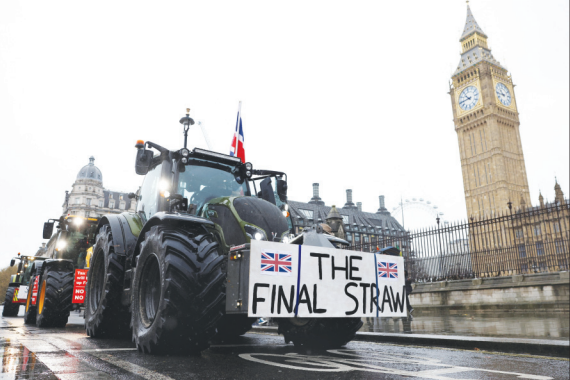The Future of Farming in the UK
“`html
Farmers Take to the Streets of Central London: A Bold Stand Against Tax Changes!
The Context of the Protests
In a striking demonstration of unity and resolve, farmers from across the UK recently gathered in Central London to protest proposed tax changes that they believe could have dire consequences for their livelihoods and the agricultural sector as a whole. This significant event reflects deep-seated concerns over government policy and its implications for foodsecurity, rural economies, and the farming community.
Understanding the Proposed Tax Changes
The tax changes under scrutiny include adjustments to agricultural subsidies, an overhaul of inheritance tax regulations, and shifts in VAT on farming supplies. These changes are perceived by many in the farming community as an existential threat. Here are some key proposals:
- Reduction in Direct Payments: Farmers could see a significant cut in the direct payments they currently receive, which play a crucial role in sustaining farm operations.
- Changes to Inheritance Tax: A proposed rise in inheritance tax on farmland could disincentivize farming families from passing their businesses to the next generation.
- Increased VAT on Supplies: Elevating VAT rates on farming supplies may lead to increased costs, adversely impacting overall profit margins.
Why Farmers Are Taking a Stand
The protests are not merely about taxes; they symbolize the frustrations of farmers facing an uphill battle against rising costs, climate change, and government policies seen as detrimental to their success. Here are some fundamental reasons for the protests:
Impact on Food Security
As the agricultural sector becomes more precarious, the security of food supply is jeopardized. Farmers argue that these tax changes could lead to fewer local food producers and increased reliance on imports, undermining sustainability.
Rural Economic Stability
Farming is a cornerstone of many rural economies. By jeopardizing farms, these tax proposals could lead to job losses, declining local businesses, and community disintegration.
Long-term Viability of Farming
With the farming industry already battling issues such as unpredictable weather patterns and market volatility, any financial strain is met with resistance. Farmers believe these tax changes will make it increasingly difficult for them to operate sustainably.
Profiles of the Protesters
The protest brought together a diverse group of voices from the farming community, each with personal stories that highlight the challenges they face. Here are a few profiles:
| Name | Farm Type | Region | Reason for Protesting |
|---|---|---|---|
| John Smith | Dairy | Somerset | Concerned over reduced payments impacting his business. |
| Sarah Johnson | Crops | Norfolk | High VAT on supplies threatening her profit margins. |
| Mark Williams | Mixed Farm | Yorkshire | Worries about inheritance tax discouraging family farms. |
The Voices Behind the Protests
Farmers expressed their sentiments passionately at the event. Here are some notable quotes:
“These changes are not just numbers on a spreadsheet; they’re livelihoods, they’re families, they’re communities.”
“We need a government that supports us, not one that puts us on the brink of collapse.”
<
Farmers Protest Inheritance Tax Reforms in Central London
On Tuesday, farmers gathered in the heart of London to express their concerns regarding new inheritance tax legislation anticipated to impose significant financial burdens on agricultural professionals. Industry leaders claim these changes could compel farmers to sell off portions of their land, thereby jeopardizing the country’s food supply.
The Background of Inheritance Tax for Farms
Historically, farms have benefitted from a specific policy since 1992 that facilitates the transfer of agricultural land within families without incurring inheritance tax liabilities. This arrangement was established to motivate generations to continue farming and support national food security efforts.
Proposed Changes Spark Outrage
The budget introduced by Chancellor Rachel Reeves proposes significant alterations set to take effect from April 2026. Under the new rules, farms valued above a certain threshold would incur an inheritance tax rate of 20% instead of the typical 40%. However, this adjustment includes a provision that allows any taxes owed to be spread over a decade interest-free, which contrasts with the immediate payments required for other assets.
Voices from the Farming Community
Tom Bradshaw, President of the National Farmers’ Union (NFU), voiced his frustrations during an interview with Sky News. He referenced previous assurances made by Steve Reed—currently serving as Secretary of State for Environment, Food and Rural Affairs—who promised at a conference last year that such adjustments would not occur.
Bradshaw lamented that farmers often find themselves “asset rich but cash poor,” noting their critical role in sustaining national food supplies while struggling financially under current conditions. “If we could ensure proper margins on food production and contribute more significantly through taxation — we would welcome that,” he stated emphatically. “However, present-day conditions do not allow it.”
Government’s Justification for Change
In remarks preceding the protest event, Reed acknowledged a transformation in his stance after taking office and understanding fiscal constraints facing government services. He stated on BBC’s airwaves that maintaining public service stability must be approached fairly: “It’s appropriate to ask wealthier farmers—and individuals purchasing vast farming estates simply to evade financial responsibilities—to equitably share this burden.”
Victoria Vyvyan from the Country Land and Business Association expressed her deep concern about potential repercussions stemming from these reforms: “We could see around 70,000 farms impacted negatively across the United Kingdom.” However, this estimate reflects all farms meeting valuation criteria historically rather than definitively facing mounting tax obligations.
Statistical Perspective on Financial Impact
According to BBC’s Verify unit analysis supplemented by insights from Paul Johnson—the Director at Institute for Fiscal Studies—only about 500 farms may realistically incur these new charges annually despite broader estimates claiming far greater numbers affected.
Johnson elaborated: “The proposed revisions are aimed squarely at some exceptionally valuable enterprises; even under revised frameworks they maintain benefits unseen over prior decades.”
Support Amidst Dissenting Opinions
During protests against these changes outside Westminster Palace, Conservative leader Kemi Badenoch showed solidarity with agricultural workers: “Farmers require our defense; your lifelong dedication nurtures us all.” She warned against detrimental impacts linked with initial proposals stating her commitment towards ceasing unfavorable taxation if those in power fail reconsider promptly.
Maintaining continuity amidst conflicting perspectives surrounding fiscal issues priorly discussed was emphasized through statements made by Rachel Reeves before farmer demonstrations took place.
Reeves justified her approach stating: “The adjustments made concerning agricultural property relief ensure affluent estates contribute fairly toward financing necessary services such as education and healthcare utilized extensively throughout rural communities.”


